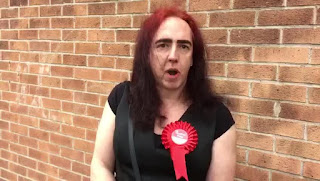Category Archives: multiculturalism
CLEARING THE WEEDS IN THE POLITICAL GARDEN
CLEARING THE WEEDS IN THE POLITICAL GARDEN
ESSEX POLICE DIVERSITY CAMPAIGN
ESSEX POLICE DIVERSITY CAMPAIGN
To: robintilbrook@aol.com <robintilbrook@aol.com>
Sent: Mon, 14 Jan 2019 9:23
Subject: FOI 12512
To: roger.hirst <roger.hirst@essex.pnn.police.uk>
Sent: Sat, 19 Jan 2019 13:47
Subject: Fwd: FOI 12512
COULD YOUNG FABIAN SOCIALISTS BECOME ENGLISH NATIONALISTS?
COULD YOUNG FABIAN SOCIALISTS BECOME ENGLISH NATIONALISTS?
English identity and Labour
This is the text of a talk given to the Young Fabians in Westminster on 8th January 2019.
REMEMBRANCE OF THE FALLEN MULTICULTURALISED
Through dust of conflict and through battle-flame,
Tranquil you lie, your knightly virtue proved,
Your memory hallowed in the Land you loved.
Proudly you gathered, rank on rank to war,
As who had heard God’s message from afar;
All you had hoped for, all you had, you gave
To save Mankind – yourselves you scorned to save.
Splendid you passed, the great surrender made,
Into the light that nevermore shall fade;
Deep your contentment in that blest abode,
Who wait the last clear trumpet-call of God.
Long years ago, as earth lay dark and still
Rose a loud cry upon a lonely hill,
While in the frailty of our human clay
Christ, our Redeemer, passed the self-same way.
Still stands his cross from that dread hour to this
Like some bright star above the dark abyss;
Still through the veil the victor’s pitying eyes
Look down to bless our lesser Calvaries.
These were his servants, in his steps they trod,
Following through death the martyr’d Son of God:
Victor he rose; victorious too shall rise
They who have drunk his cup of sacrifice.
O risen Lord, O shepherd of our dead,
Whose cross has bought them and whose staff has led-
In glorious hope their proud and sorrowing land
Commits her children to thy gracious hand.
JUDGE BRETT KAVANAUGH, THE LEFT’S CULTURE WAR AND THE US SUPREME COURT NOMINATION PROCESS
ENGLISH ETHNICITY – LABOUR’S VIEW
“How the decline of the working class made Labour a Party of the bourgeois left. Progressive politics in the 1990s turned away from class politics and solidarity in favour of group identities and self-realisation”
THERESA MAY AND HER GOVERNMENT MAKE FAKE NEWS
CLAIMS OF UNFAIR RACIAL DISPARITY IN LEGAL EXAM RESULTS DISPUTED
CLAIMS OF UNFAIR RACIAL DISPARITY IN LEGAL EXAM RESULTS DISPUTED
The Law Society Gazette is the in-house magazine for the Society of England and Wales,which is the professional body for all Solicitors in the English and Welsh jurisdiction. Like all such organisations there is a creeping move towards political correctness and “positive action”towards “diversity”; “multi-culturalism and globalisation”. An example of this appeared recently in the 8thJanuary issue of the Gazette. It was entitled“Racial Disparity in exams by Max Walters”. Here is his article :-
Minority ethnic students lagging behind in LPC success
By Max Walters
White students are more likely to pass their legal exams and law conversion courses than people from an ethnic minority background, data from the Solicitors Regulation Authority has revealed.
According to an SRA report, almost 80% of white students successfully completed their LPC, compared with only 40% of black students and 53% of Asian/Asian British students.
The figures, which cover September 2015 to August 2016, were published on the SRA website at the end of last year.
They appear in the annual ‘Authorisation and Monitoring Report’ which focuses on the success rates for two qualifications – the legal practice course (LPC)and the common professional examination (CPE) – a conversion course for non-law graduates.
It will come as another blow for the profession’s reputation for diversity after barristers’ regulator the Bar Standards Board revealed at the end of last year that black and minority ethnic (BME) students were half as likely as their white counterparts to achieve pupillage.
The figures for CPE candidates were similar to those taking the LPC. Among white students, 74% successfully completed the course, compared with 33% of black students and 46% of Asian students.
The report also reveals a stark gap between success at training institutions.
For the LPC, one provider achieved a pass rate of 100%, compared with 30% at another. CPE completion rates were similar and varied from less than 45% to100%. ?The providers have not been named.
The report also reveals that the University of Hertfordshire has opted to reinstate the LPC this year. The university suspended the course in 2016 in light of forthcoming changes to qualification. The Gazette has contacted the university for comment.
Here is the link to the original article>>> https://www.lawgazette.co.uk/law/minority-ethnic-students-lagging-behind-in-lpc-success/5064169.article
Here is my letter to the Editor in reply:-
Dear Sir
Your article in the 8th January issue of the Law Society Gazette:-“Racial disparity in exam results” by Max Walters
The statistics which Mr Walters quotes of “disparity” between “Black” and “Asian”Students and “White” Students may not actually “constitute a fresh blow to the profession’s reputation for inclusion”. For that inference to be properly drawn we would have to know whether the LPC “providers” were requiring the same levels of prior academic achievement from prospective students from each of these respective racial groups.
Anecdotally it would appear that the providers are actually not requiring the same level of academic achievement from each of the racial groups. Instead the providers appear to be offering course places at least partly on the basis of politically correct “positive discrimination”.
In other reports it also appears that “Asian” were 22% and “Black” were 9% of the total candidates. This is well over the percentage of these racial groups compared with their percentages of the population as per the 2011 Census. These percentages mean that even given their lower pass rates more Asian and Black candidates are becoming solicitors than these racial groups proportion of the population of England. It is actually English candidates who are underrepresented (so much for “White Privilege”?).
This supports the idea that “positive discrimination” is occurring which confirms that the “providers” are probably giving places to “Asian” and “Black” students who have not previously done as well academically as the “White”students. It may therefore be the reported results are hardly surprising. Law exams are testing knowledge of what is objectivity true. Hence, it was always improbable that racial discrimination came into the picture.
The disturbing implication of Mr Walters’ article is that he may be implying the academic standards for the LPC should be lowered. If this is his intention then the impact on the basic purpose of open examinations and of Professional regulation (which is to create a profession able to maintain and guarantee high professional standards of service to the public) would be sacrificed on the altar of politically correct “diversity” targets!
Yours sincerely
Robin Tilbrook
Solicitor& Chairman of the English Democrats
What do you think?
HOME SECRETARY “GOING TO … DEPORT UNDESIRABLES” AND “ALIEN REFUSE OF THE WORLD”
HOME SECRETARY “GOING TO … DEPORT UNDESIRABLES” AND “ALIEN REFUSE OF THE WORLD”
The Conservative Home Secretary declared:-
“I am going to curtail alien immigration and deport undesirables; we do not want to flood England with the alien refuse of the world. I regard aliens who live in their own communities, marry within them, and speak their own language, as unsuitable to be British residents.”.
You might think that was a startling change from the usual mealy mouthed multi-culturalism and political correctness of our Home Secretary, but then that is a direct quotation from a predecessor of hers:- the Conservative Home Secretary, Sir William Joynson-Hicks, Bt. Conservative Home Secretary, 1924)!
Of course in those days Conservative Home Secretaries were proper Conservatives and were also patriots who would be revolted by the current Home Secretary’s unpatriotic support for foreigners ruling over us through the EU!
Sir William Joynson-Hicks would also undoubtedly be revolted by the current Government’s recent announcements about the racial divide to which you can find here >>> Prime Minister orders government audit to tackle racial disparities in public service outcomes – GOV.UK
This has been done with the intention, no doubt, of enforcing yet more vigorously the failing UK State policy of multi-culturalism.
Our inept Prime Minister claims to be a Conservative. This is however the woman who told the House of Commons on its introduction by Labour’s Harriet Harman, that she welcomed the Equality Act but thought that bad thing about the Equality Act is that it didn’t go further!
Mrs May said:- “The Government I lead will stand up for you and your family against injustice and inequality. Today I am launching an audit to look into racial disparities in our public services that stretches right across government. This audit will reveal difficult truths, but we should not be apologetic about shining a light on injustices as never before.”
Such is the lack of “joined up thinking” within her Government that Theresa May and her Community’s Minister, Savid Javid may have missed the fact that they have destroyed the oft repeated multi-culturalist claim that “mass immigration boosts the economy”.
What her Government has released now is incontrovertable evidence that, far from boosting the economy, mass immigration has given rise to a vast additional swathe of claimants on our benefits system which the rest of us are required to work to pay for.
As a result of these claims all our benefits from the welfare system including the right to claim a pension must be reduced to free the necessary reserves of money to pay for indigent immigrants!
Are you happy about this?










